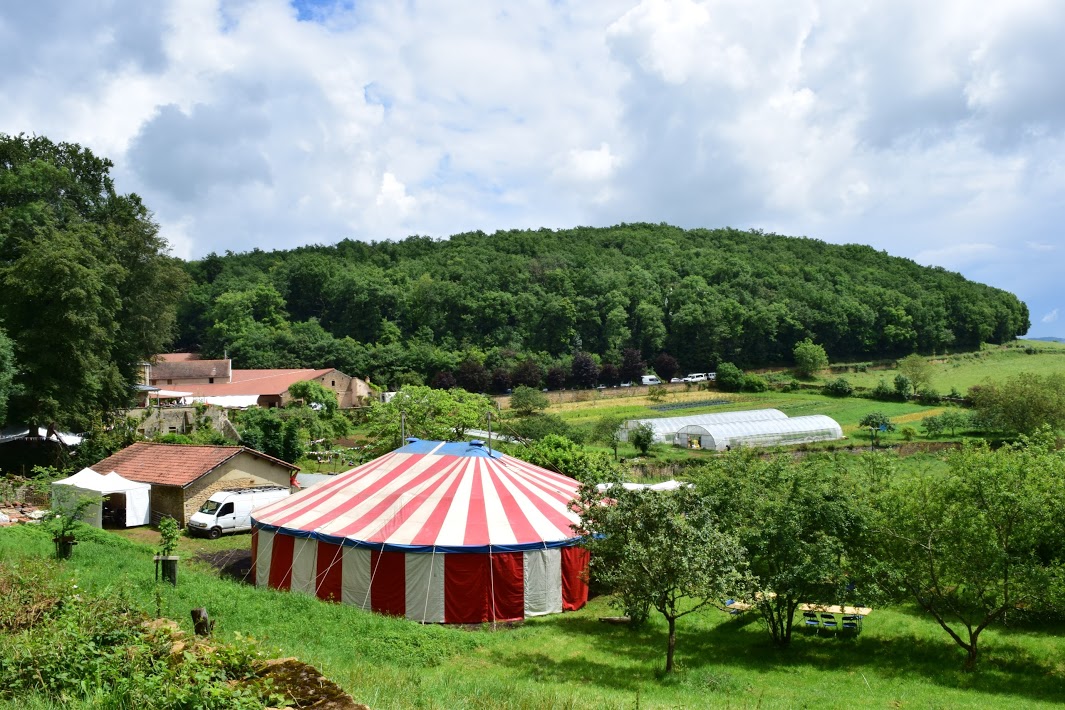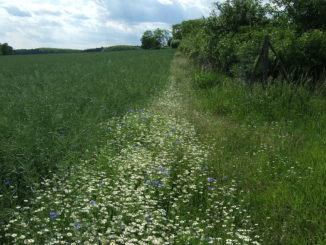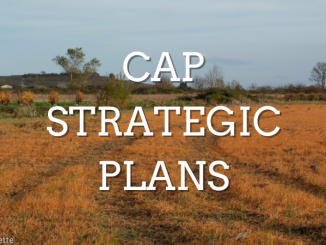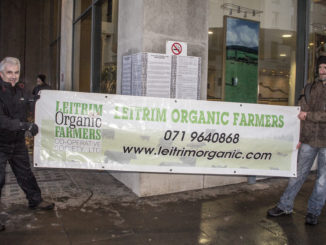
The P2P Foundation’s Michel Bauwens interviews Julien Reynier and Fabrice Clerc from L’Atelier Paysan
L’Atelier Paysan is a French cooperative that works with farmers to design machines and buildings adapted to the specific practices of small farm agroecology. In addition to distributing free plans on its website, L’Atelier Paysan organizes winter self-help training sessions, during which farmers train in metalworking and build tools which they can then use on their own farms. L’Atelier Paysan works to develop the technological sovereignty of farmers by helping them to become more autonomous through learning and regain knowledge and skills.
In market gardening, crops are grown on beds formed from long strips of land. Generally, little or no attention is paid to ground compaction by tractor wheels. In subsequent years, farmers will then try to grow on these tracks. The idea of permanent, “ridged” beds is to form perennial growing beds so the tractor wheels always run in the same place. Tools are needed to form these ridged beds, which allow crops to have superior moisture retention and drainage, and to warm up better in the sun.
Michel Bauwens: What was the origin of L’Atelier Paysan project?
Julien and Fabrice: The project was born in 2009 after a meeting between Joseph Templier, an organic market gardener from GAEC “Les Jardins du Temple” in Isère (south-eastern France, near the Alps), and Fabrice Clerc, then a technician with ADABio, the local organic agriculture development association. ADABio was created in 1984 to help improve practices, find resources, and share knowledge, among other things.
Joseph and his colleagues used tools on the farm that are very relevant to the soil, especially adapted to an innovative cultural technique called “permanent beds”. Many young farmers came to train in the techniques, the system and the organization of the “Jardins du Temple” and then to practice them on their own farms and projects. At the same time, Fabrice went to many farms in the Rhone Alps to collect and disseminate knowledge and agrarian know-how. Fabrice and Joseph’s idea was to widely publicise the innovative tools used on this farm, which were crafted and assembled from recovered materials and refurbished old tools. Some standardization was necessary first, in order to be able to publish plans for building the tools from parts and accessories that can be found at any hardware store.

Your approach seems very pragmatic. Yet when I read through your website, it is also a very thoughtful approach (philosophical and political). How did you move from one approach to another?
We have just put into words what is happening. A number of farmers in the Alps independently designed and built their own machines, adapted to their own needs. We have gathered and compiled all this into a guide. In the process of constructing this guide, it seemed useful to formalise our approach: first, to take an inventory of innovations on the ground, then to answer the question “what is the meaning of all this?” Why all these bottom-up innovations, which were traditionally outsourced to the equipment manufacturing industry. So, why was the farming world excluded from the design process? Whereas the farmer and the artisan of the village once built the machines needed, now farmers have disappeared from the chain of innovation.
It is not only in the agricultural sector that this has happened: it’s possible to build bridges with changes in other areas such as shared self-build community workshops, and to think about Do It Yourself from the viewpoint of human/social (re)construction. For example, in Grenoble, there are about ten woodworking workshops with available machines and tools, and self-renovation housing initiatives. They are important factors for emancipation, inclusion and social reintegration. For the last 6 or 7 years, we have been thinking a lot about these issues. We don’t want to just make machines. It is a total experience that consists of thinking about daily life and of the political approach it requires.
Current political debate reflects a very strong social demand on the ground. The guide to self-construction is the first book we published in 2012. This is the sum of the first field census of sixteen machines adapted to organic market gardening. These machines, which are low tech (in construction and design) call for a lot of craft know-how. They do not suffer in comparison with high-tech machines. Our machines are three to four times cheaper for an efficiency equal or superior to those of the trade. Why is this search for autonomy not more valued? This is a question of the technological sovereignty of farmers. It is something that is coming back into fashion, taken up by a militant farming community.
The word “farmer” was, until the 1980s, a word used to denigrate. Today, on the contrary, it means someone who is not only a cultivator of agricultural produce but part of a terroir, connected to an ecosystem and a social life. The word “farmer” relates to the invention of a specialized, segmented profession. Today they are even called “producer”, “operator”, or “Chief Operating Officer”. The logic of industrialists and economists invades agriculture.
Photos in this article come from another really interesting essay about the event les Rencontres de l’Atelier Paysan. Words (at the link) and photos (here and at the link) by Samuel Oslund of l’Atelier Paysan.
What are the current project developments?
The approach is open to the whole field of small and organic farming on a human scale. It started around organic market gardening, but now it is open to all sectors: arboriculture, breeding, viticulture… For example, we can include the re-design of livestock buildings and storage. For market gardeners who want to add some poultry farming to their production, we are also working on the issue of mobile buildings.
Depending on the demands of the farmers’ groups on the ground, our resource platform will respond to co-design the tools required for the specific practices of small and organic farmers. We want these tools to be used by conventional farmers to help them adopt a more autonomous and economical approach. It is becoming increasingly credible because it is intended to be a resource available to all farmers. Most of our users are already going through this process, but the technical principles developed, aim to ensure that conventional farmers are no longer frightened by the demanding, know-how-based, techniques of small farm agroecology.
The project started in 2009 at ADABio, a local association of organic producers, but very quickly grew to such a large scale that in 2011 a transitional association was created and then converted into a cooperative in 2014: L’Atelier Paysan. In this human adventure, meetings played a very important part. At each meeting, we took sideways steps, then small jumps and then big jumps. Today we are 11 permanent staff, quite a lot of seasonal staff as well as those who volunteer as a civic service. Everyone comes as who they are and our approach is closely linked to what each person brings. We are very attentive to the requests that come to us, and we have more and more!

What is your business model?
We operate 65% through self-financing and 35% from public funding. In our view, these are normal contributions to our effort to produce and disseminate common goods. We believe that we are in the public interest and that communities need to be involved. Unfortunately, with the reactionary right-wing coming to power in many places, this sort of support has been drastically reduced.
However, we are relatively more secure than other structures, sometimes subsidized at 80%. The 65% self-financing comes from our self-build training activity. In France there are joint vocational training funds that can cover the cost of training. We also profit from a margin on group orders for internships.
We will raise funds more and more from the public: if we want to change the agriculture / food model, the whole of society is involved. That’s why we have set up a partnership with a Citoyens Solidaire endowment fund to collect donations and the associated tax*. It is a mechanism that allows people to choose where their taxes are going. We want to make citizens aware of our work so that they can contribute to the economic independence of L’Atelier Paysan.
What is your relationship with other farmer or social movements?
L’Atelier Paysan is positioned as one of the actors in the alternative food project, an additional tool in the social and solidarity-based agricultural economy. As actors of this arena, we naturally wanted to associate ourselves with those that represent the agricultural environment, to connect, so that they might disseminate our information, our technical material and to bring together our different users. Moreover, the question of agricultural machinery was very seldom dealt with by the existing organisations.
Also, we have had an awareness-raising activity for a year now, through the InPACTassociation, which brings together about ten associations at the national level. We have been the standard-bearers for the technological sovereignty of farmers in this context, in particular to document and expose, on the one hand, the over-sizing of farming equipment production tool and, on the other hand, the publicly funded introduction of robotics and digital technology supported by the techno-scientific community.
At the international level, we are in the Via Campesina network. We participated in the 2nd Nyéléni forum on food sovereignty (in October 2016 in Romania) where we talked about agricultural equipment, saying that there can be no food independence without farmers’ technological sovereignty.
At the forum we met with Spaniards, Romanians, Austrians, Czechs and Hungarians, who were very interested in questions around farming equipment. We staged an exhibition of drawings and fact sheets that really appealed to people. It was not especially a field of exploration for these activists, and there, something happened. No one in Europe has yet set up a platform such as L’Atelier Paysan, which provides ways to document and disseminate knowledge (data sheets, self-construction training …).
We went to Quebec in January 2014 to organize the first self-build training in North America, with the CAPÉ (Coopérative d’Agriculteurs de Proximlité Écologique) and l’EPSH (École professionnelle de Saint-Hyacinthe ), around the vibroplanche (for cultivating permanent “ridged” beds). And now, they independently create self-build courses from the shared tools on our website.
In the United States, we are connected with Farm Hack, incubated and launched by Greenhorns, which itself came from a young-farmer’s coalition, the NYFC (National Young Farmers Coalition). They share tips on adapting machinery via hackathons and open-hacking camps. Though they have not yet organized any training.
We also have discussions with the Land Workers Alliance (a member of Via Campesina) in England. Two years ago they organized the first Farmhack event which we attended to present our work.
Here, a farmer can come for training and can build their own tools: it doesn’t cost much thanks to our famous training funds and group-buying of materials and accessories. Working with metal, tool use (a kind of after-sales service), sharing (using the machine and adapting it to their context in the form of versioning); this is the whole methodology that one wants to share. There is a very specific context in France, which means that a structure like ours can still rely on a large amount of public aid and shared professional funds to pay for the internships (this is not the case in the USA, for example, which has to rely on private funds).
In general, our approach is total, that is what is exciting in this adventure. We are giving ourselves the means to advance this process, between ourselves and with other actors. From a practical point of view, to reach one person is good, but to reach many takes us much further. We also consider political and economic issues, and what are the factors for acceleration and efficiency. The question of agricultural machinery is a question of political and scientific thought. On the whole, on a whole bunch of questions, there is no science-based production. On April 5th we are organizing a seminar on technological sovereignty: we have struggled to find people who have admitted incompetence. These are questions they have never faced.

What do you think of the “Commons” as a political concept?
We would like to be further advanced on this issue of the Commons. We assume that the issue of food, like drinking water, the air we breathe and biodiversity, are essential to protect. In turn, the means to achieve it (know-how, agricultural land, communal areas, techniques…) must by definition be common, since this is the survival of our species. All the know-how and the knowledge of farmers did not come ex nihilo [from nothing. Ed]: they come from sharing, putting into a common pot, shared innovation and openness. We see as a scandal any attempt to expropriate technological solutions so that they can be part of another feed-source for personal profit. This is an issue that we are exploring and trying to pay attention to.
We are alert to the legal regimes related to this issue of the Commons, to open licenses and to what could best reflect this willingness to share knowledge through which we enrich our community of users. If we use Creative Commons, we are always looking for the right license that best expresses this willingness to share.
The starting material of our work are the tools developed by Joseph: he participated very much in the emergence of these communities. But he didn’t only tinker with machines, he also thought of them with regard to a working group of farmers who wanted to adopt the innovative cultural techniques of permanent beds. His machines are designed in a collective. It is therefore the result of a whole lot of visits and picking up of knowledge and know-how from his peers. He had the talent and the energy to imagine and manufacture these machines. It is his way of contributing, like other activists.
How do you see social change? The political atmosphere is not very positive for the change we want. Do you imagine that you work in a “hostile environment”? Is there a political side to your work?
There is the question of public education. The first step of the document on the technological sovereignty of farmers will be to amalgamate the ideas of the users, the political partners, etc. Some participants in our training events do not take long to take the ideas and techniques and disseminate them.
We are also starting to have quite a lot of feedback from researchers / thinkers, who congratulate us for imagining this new way of thinking. This is our goal because we are not going to be able to produce everything: scientific studies, political thinking … What partnerships can be set up to make common the commonalities of these subjects? Additional advocates can be found at meetings. We do not have a strategy. There is nothing stronger than a groundswell to spread our way of doing things. The tidal wave will be less important, there will be no media buzz, no pretty teaser with a background of country music, but this is much more powerful. When people have experienced their ability for self-determination, there is a kind of arriving without the possibility of backtracking.
Are there projects similar to yours but which you criticize and if so, why?
We are quite distinct from the sort of ideas promoted by the likes of Open Source Ecology in the US with a beautiful trailer, to us that does not seem grounded in reality. None of the machines actually work. It is a process of innovation that comes from not involving real users. They are engineers who imagine things a bit on their own.
We are also distancing ourselves from Fablabs, which seem to be an incubator for start-ups rather than for public education. For us, a Fablab must be a place of public education and not of low-cost technological experimentation for the industry.
We are in Grenoble, the cradle of nanotechnology. Here, a Fablab is funded by industry and advanced technology. So there is Fablab after Fablab (woodworking, pedal-powered machines…), and they are generally talking about something other than the quality of what is produced. It takes funding to run a Fablab. In 2013, those who won the call for projects from the Ministry of the Digital Economy are not those who provide public education. How do we finance a general interest?
More broadly, if by Fablab we mean laboratories of open innovation and shared human resources, there are tens of thousands in France. There are ecocentres, Third-Places, associations related to self-build, others that repair bicycles, social innovation, human and economic. They are not necessarily in the high-tech field and are less publicized, but they are working on the necessary questions.

Where do you see yourself in 10 years? How do you think the world will be in which you will evolve? Do you project yourself into the “global arena” and if yes / no, why and how?
The observation is that today, in January, we do not know much about where we will be at the end of December. This has been true since the beginning of the adventure. We are in an exploratory phase, and it is very difficult to know where we will be in 3 years. After 5 years we have already exceeded our dreams of 3 or 4 years ago! Our collective dynamics explode, economically we will have to find more avenues because humanly we will not be able to go much further. We refuse work every day! One of the interesting tracks in a time-scale of 3 or 4 years is to set up our own training centre on a farm with a workshop training centre suited to our needs, a logistics platform, a classroom, offices, garages, and accommodation. Why a farm? To have our feet on the ground, a real support for our experimentation and a working tool to match our needs. Today we operate within our means, but we have ways to improve our work.
In the years to come, beyond the concerts at Rock à la Meuleuse (rock on the grinder) which we organized during our Rencontres in June 2016, we have plans to explore an illustration of our work through contemporary art.
Among the perspectives, we imagine a European network centred on technological sovereignty. In the world of development and international cooperation associations, this idea has been around since the 1970s, based on appropriate technologies: reclaiming ourselves, being more sociable, connecting and building links throughout Europe so that there are more exchanges between our different countries.
Our adventure is not without effort. Part of what helps us keep going is that we don’t miss out on poetry, pleasure and being as we are. We thoroughly, and I mean thoroughly, explore the paths and horizons that are available to us.
One of the objectives for which we believe we are on the right track is the following: while in France local development has always been specialized, today things are actually de-compartmentalized. If we think about things more “globally”, we will participate in developing something richer, more powerful and sustainable. What makes us strong is that we control the whole chain: self-building at the political and collective level.
We are full of energy: our desire is to testify that the fields we are exploring with the methodologies we use, can be applied to a whole bunch of other things.
This article was written by Michel Bauwens for the P2P foundation’s blog, where it first appeared under a Creative Commons Attribution – Share Alike 3.0 Unported License. Read the details…
All images by L’Atelier Paysan. Check out the full photo essay here.
Interview translated by William Charlton and edited by Ann Marie Utratel.
*A registered (private) donor can get a tax exemption of 66% on a donation. On a donation of €150, the donor receives a €100 rebate – the recipient gets 80% of the donation i.e. €120 http://www.citoyens-solidaires.fr/don-particulier/ for business donations (60% tax exemption) see http://www.citoyens-solidaires.fr/don-entreprise/
AgTechTakeback | Neither neoLuddism nor Corporate Ag – Towards a Holistic Agroecology





